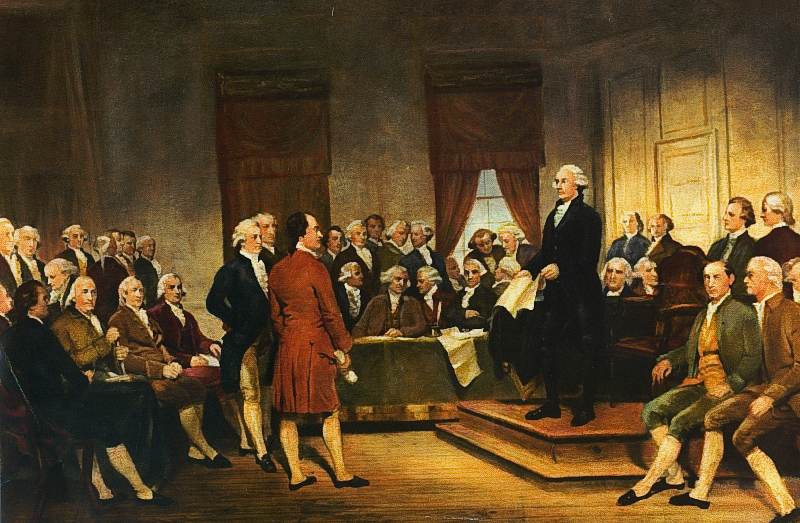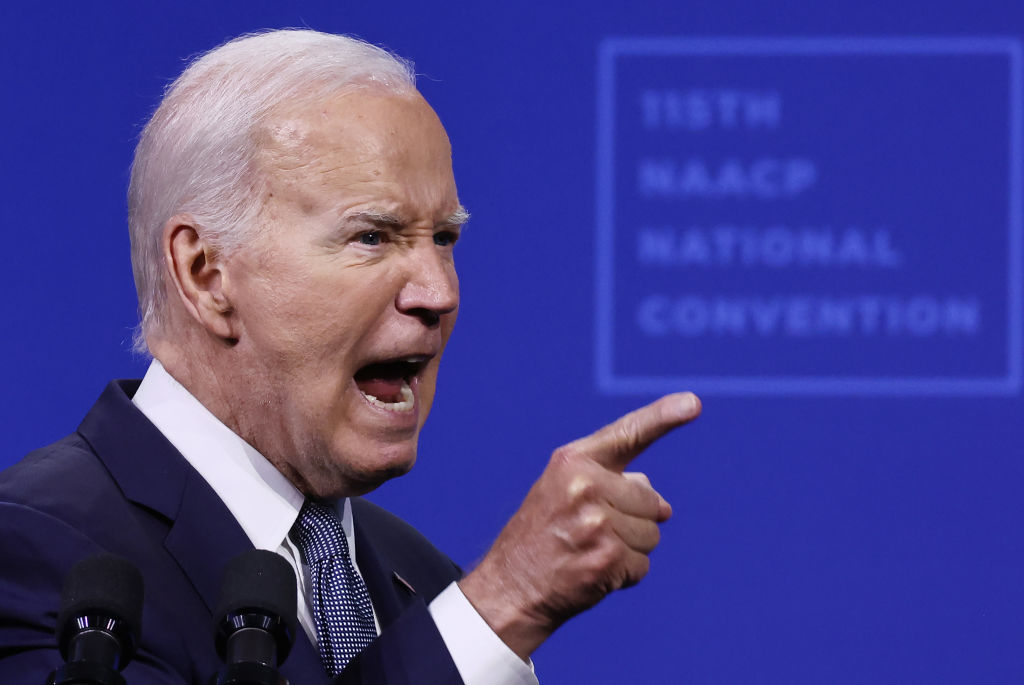Kamala’s Mask

The Democrat standard-bearer is whatever her bosses order her to be.
America knows Kamala Harris as a race-mongering soft-on-crime radical. At the height of the Black Lives Matter movement, then vice presidential hopeful Harris promised to “reimagine public safety” in America:
It is outdated, it is wrongheaded thinking to think that the only way you’re gonna get communities to be safe is to put more police officers on the street.
Of the criminals burning American cities she said:
They are not going to stop, so everyone beware. They’re not going to let up… nor should they.
During that campaign she made an open appeal on behalf of the Minnesota Freedom Fund, which bailed out the George Floyd rioters, including a man who allegedly committed murder. The same year she endorsed Soros-backed San Franciscan George Gascon for Los Angeles district attorney.
Harris, of course, started her own political career as a prosecutor — first as district attorney of San Francisco and then attorney general of California. In that capacity she was much less of an ideologically-minded social justice reformer.
The current Democrat presidential contender was elected district attorney of San Francisco in 2003. She defeated incumbent Terrence Hallinan, a former counterculture lawyer whose scandalous adventures included passing out on heroin in Janis Joplin’s Haight-Ashbury living room.
Back in 2003, even in San Francisco, district attorneys were not expected to subvert the law. The Soros-funded DA movement didn’t emerge until the late 2010s, when Chesa Boudin, the son of domestic terrorists from the Weather Underground, won the ranked choice election to “test…the boundaries of what’s possible” as an anti-law-enforcement head prosecutor.
Kamala Harris, whose mentor and former boyfriend Willie Brown was one of the most powerful figures in California state politics, was part of an expansive political machine, and she ran the attorney general’s office along the lines of a twentieth century urban prosecutor. She refused to cooperate with ICE in disclosing the immigration status of criminal offenders, but such antics are the baseline in leftwing sanctuary cities like San Francisco.
Until recently, San Francisco was a colorful but relatively safe town—small (with under a million residents), wealthy, and surrounded by water. With antisocial behavior largely confined to certain districts such as the Tenderloin, San Francisco lived up to its reputation as one of America’s urban jewels. Its murder rate was much lower than in gritty Oakland across the Bay, but the Golden Gate city distinguished itself in drug-related deaths. In that category, San Francisco posted statistics nine times the national average — until the opiate epidemic caught the rest of America up.
As DA, Harris focused her attention, somewhat strangely, on marijuana offenses. In the Bay Area, pot is considered about as exotic as vitamin supplements. To be fair, she was in line with her predecessor — Hallinan prosecuted even more of those types of violations. But Harris opposed recreational marijuana and in 2010 co-authored the rebuttal to the pro-legalization argument for the California voter guide. Although she changed her position on cannabis prohibition once she rose to the national stage, there is little doubt that the prosecution of marijuana offenses in one of the most permissive American municipalities contributed to her downfall as a presidential contender. During the 2020 presidential debate, Hawaii congresswoman Tulsi Gabbard noted: “she put over 1,500 people in jail for marijuana violations and then laughed about it when asked if she ever smoked marijuana.” Kamala’s candidacy was already faltering, and that remark finished it.
Harris pursued another surprising agenda, going after the parents of chronically absent public school students. As DA, she sent out letters threatening every parent in the district with fines and jail time should their children miss too many school days. The San Francisco Unified School District took it from there, so only a handful of parents were prosecuted, and none went to jail. All the while, though, District Attorney Harris successfully lobbied the California Legislature for tougher attendance laws, and she continued the anti-truancy campaign as state attorney general. Scores of parents of delinquent children were arrested across California.
Kamala justified her interest in truancy by arguing that school dropouts become both criminals and victims of crime. She cast her actions as preventative, but the wide net she set caught marginal cases, like the parents of special needs students. And while her presidential campaign paints a picture of a progressive prosecutor ready to go after the shady sexual predator Donald Trump, at the time of her first run progressives found her stance in chronic absenteeism punitive and racist. From their point of view, it punished struggling minority mothers and did nothing to address the root causes of truancy. And what do you know — the childless vice president laughed about putting parents (and children) in jail, just like she laughed about prosecuting marijuana offenses.
Kamala Harris took over as attorney general in 2011, by which time the political zeitgeist had changed. The tough-love years of George W. Bush’s reign and Obama’s first term gave way to the full Progressive onslaught of system-blaming for all societal ills. Attorney General Harris rode the waves of public sentiment to the left, advocating for the passage of Propositions 47 and 57. The now infamous Prop 47 was approved by voters in 2014 under the title Safe Neighborhoods And Schools Act. It was Harris who gave it that title and wrote a favorable description of it in the voter guide, deceiving voters. Far from keeping anyone safe, the proposition lowered penalties for a wide range of offenses, notably stealing less than $950 worth of merchandise, which was now classified as a misdemeanor. Proposition 47 was specifically intended to reduce incarceration by tightening the definition of criminality; the result was fewer criminals in jail, and more crime on the streets. If that was not enough, in 2016 Attorney General Harris wrote a positive blurb for Prop 57, the Orwellian Public Safety And Rehabilitation Act that facilitated the release of criminals from California prisons.
Reinforced by the weakening of police departments, the two laws sent California into a tailspin of criminality. They transformed urban centers into killing fields and turned roads and bridges into side show party centers. They created food deserts in minority neighborhoods where smash and grab theft forced the closures of grocery stores.
In retrospect, Kamala’s efforts to preempt criminality via prosecution of truancy seem a bit silly. The tsunami of criminality that she unleashed with Propositions 47 and 57 compensated for whatever little her initiatives accomplished. And while the “root causes” matter, it’s strange that she zeroed in on chronic absenteeism instead of the breakdown of the nuclear family. Why didn’t she consider that family trouble often manifest as truancy? Vice President Harris’s philosophical underpinning are questionable. And so are her political instincts and personality traits.
Kamala’s history as a prosecutor is odd and inconsistent. She appears to follow trends and do as she is told. Her ascension as figurehead leader of the Democrat Party makes a certain degree of sense when one considers how the actions of Party leadership are so divorced from the expressions of the base. Kamala Harris was so unpopular as a presidential candidate in 2020 that she polled in the single digits in her home state, and had to drop out in 2019. Like Joe Biden before her, she will make a weak, easily controlled president. That’s probably the idea.
The American Mind presents a range of perspectives. Views are writers’ own and do not necessarily represent those of The Claremont Institute.
The American Mind is a publication of the Claremont Institute, a non-profit 501(c)(3) organization, dedicated to restoring the principles of the American Founding to their rightful, preeminent authority in our national life. Interested in supporting our work? Gifts to the Claremont Institute are tax-deductible.
The neo-feudal Newsom model has been a disaster.
Whether Biden was once upon a time a good man or trustworthy, he no longer is.



